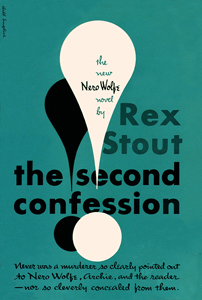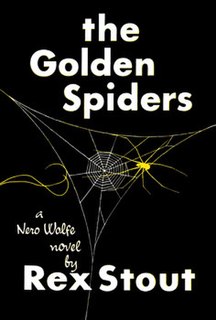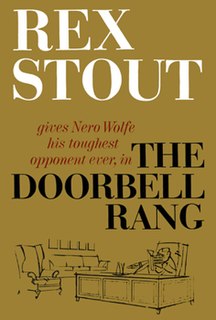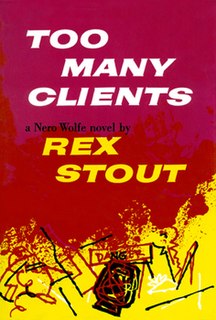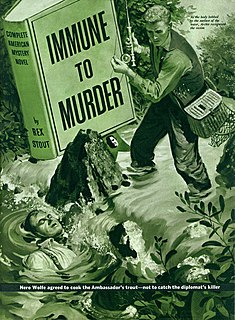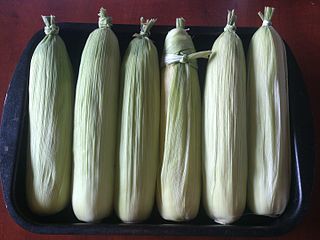Plot summary
Benjamin and Pauline Rackell engage Wolfe to investigate the death of their nephew Arthur, paying him a $3,000 retainer. Arthur had begun to show increasing support for the Communist Party, but confided to Pauline that he had been recruited by the FBI to infiltrate the group's New York organization. At a dinner party, he had brought out a pillbox from his pocket, set it on the table, and taken one of the vitamin capsules inside, only to die a few minutes later from cyanide poisoning. The other capsules in the box were found to be genuine and harmless. Pauline insists that one of the other five dinner guests must have learned the truth about Arthur and slipped the poisoned capsule into the box while he was not paying attention.
Archie visits both the local FBI office and Manhattan Homicide but is unable to get any useful information; at Wolfe's request, he arranges a meeting with the Rackells and the dinner guests at Wolfe's office. Of these latter five - Ormond Leddegard, Fifi Goheen, Della Devlin, Henry Jameson Heath, Carol Berk - only Heath is known to have ties to the Communist Party. Wolfe questions the group about the dinner party and the pillbox, not mentioning Arthur's FBI status in order to avoid tipping them off, and inadvertently sparks a confrontation between Della and Fifi over Heath's affections. Fifi says that Arthur told her he lied to Pauline about working for the FBI, a claim Pauline adamantly denies.
The next day, Archie engages Saul Panzer, Fred Durkin, and Orrie Cather to keep Heath under constant surveillance and arranges for the Rackells to see Wolfe again. Wolfe tells them that he is convinced there was an eyewitness to Arthur's murder, and offers to find that person and get the truth for a fee of $20,000. Benjamin is unconvinced, but Pauline is eager to accept the offer, and Wolfe sends Archie to visit Della and Carol in their shared apartment that night. Della says that Carol has gone to a show, but Archie finds her hiding in a closet and listening in. After she leaves, he offers Della $10,000 to tell the police that she had seen Fifi switch the capsules; she does not immediately say yes or no, and he leaves to update Wolfe and Saul.
The next morning, both Inspector Cramer and FBI Agent Wengert visit the office to confront Wolfe. They have learned of Archie's offer to Della and are furious, but Wolfe points out that their best course of action is to let him proceed, neither supporting nor opposing his plans. Archie gets updates on Heath's movements throughout the day, culminating in a meeting with a woman in Central Park at which Saul is eavesdropping. Arriving at the location, Archie finds that the woman is Pauline and brings both of them to the office. With Saul's corroboration, Wolfe determines that Heath arranged the meeting in order to persuade Pauline not to pay for Wolfe's scheme to get Fifi convicted.
Wolfe reveals that his offer to the Rackells was meant to draw out the murderer, as he had no concrete evidence or witnesses. He accuses Pauline of Arthur's murder, having become suspicious of her after she accepted his offer so quickly. She had seen it as a way to frame someone else for her crime and keep her own Communist leanings from becoming public. Wolfe pressures Heath into agreeing to tell him how much Pauline has contributed to the party, in order to keep himself from being associated with her criminal trial.
The next day, while Cramer and Wengert are going over the details of the case with Wolfe, Archie reveals that he knows who had been the real infiltrator sent by the FBI. It was Carol, who would have learned about the $10,000 offer from Della and was the only person who could have informed Wengert of it so quickly. Now that the case is over, she accepts Archie's offer of a drink.
Background
I deplore the current tendency to accuse people of pro-communism irresponsibly and unjustly …— Nero Wolfe, "Home to Roost", chapter 8
In "Nero Wolfe and the Communist Killer", Nero Wolfe exposes a Communist while at the same time disassociating himself from McCarthyism. The novella was written July 27–August 10, 1951. In November of that year, Rex Stout succeeded Oscar Hammerstein II as president of the Authors League, which included the Authors Guild and Dramatists Guild. Stout had been a leader in the organization for many years as a champion of authors' rights and freedom from censorship. In January 1952 — the month "Nero Wolfe and the Communist Killer" appeared in The American Magazine — Stout was instrumental in drafting the Authors League's statement against the blacklisting of writers whose names appeared in Red Channels . That same month Stout also helped draft a Freedom House declaration condemning Red-baiting. "Wild accusations and inexcusable inaccuracies serve to divide and confuse the country when we should be united in the task of resisting Communist aggression abroad and Communist subversion at home," the declaration stated. [1] :386–387
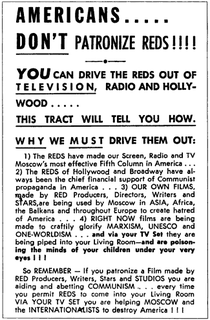
McCarthyism is the practice of making accusations of subversion or treason without proper regard for evidence. The term refers to U.S. senator Joseph McCarthy (R-Wisconsin) and has its origins in the period in the United States known as the Second Red Scare, lasting from the late 1940s through the 1950s. It was characterized by heightened political repression and a campaign spreading fear of Communist influence on American institutions and of espionage by Soviet agents.

Oscar Greeley Clendenning Hammerstein II was an American librettist, theatrical producer, and theatre director of musicals for almost 40 years. He won eight Tony Awards and two Academy Awards for Best Original Song. Many of his songs are standard repertoire for vocalists and jazz musicians. He co-wrote 850 songs.

The Authors Guild is America's oldest and largest professional organization for writers and provides advocacy on issues of free expression and copyright protection. Since its founding in 1912 as the Authors League of America, it has counted among its board members notable authors of fiction, nonfiction, and poetry, including numerous winners of the Nobel and Pulitzer Prizes and National Book Awards. It has over 9,000 members, who receive free legal advice and guidance on contracts with publishers as well as insurance services and assistance with subsidiary licensing and royalties.
When the novella (as "Home to Roost") was collected in Triple Jeopardy , Stout received "hate mail", reported John J. McAleer in his Edgar Award-winning Rex Stout: A Biography (1977):

Triple Jeopardy is a collection of Nero Wolfe mystery novellas by Rex Stout, published by the Viking Press in 1952. Itself collected in the omnibus volume Kings Full of Aces, the book comprises three stories that first appeared in The American Magazine:
The Edgar Allan Poe Awards, named after Edgar Allan Poe, are presented every year by the Mystery Writers of America, based in New York City. They honor the best in mystery fiction, non-fiction, television, film, and theater published or produced in the previous year.
A letter from one reader deplored two of the tales, "The Cop-Killer" and "Home to Roost", as "those two little stinker anti-Communist stories." By this time McCarthyism had brewed such tensions that even Anthony Boucher said aloud he wished Wolfe would find another adversary. Boucher's protest confirmed Rex's belief that McCarthy helped Communism by making anti-Communism seem reactionary. [1] :389
His leadership of the Authors League during the McCarthy Era was a principal reason Stout was regarded as either a Communist or a tool of Communist-dominated groups by J. Edgar Hoover's FBI. He was one of the many authors watched closely by the bureau, which maintained a sizable dossier on him. [2] :216–217, 227
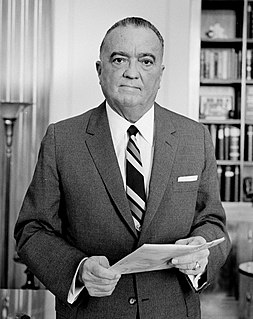
John Edgar Hoover was the first Director of the Federal Bureau of Investigation (FBI) of the United States and an American law enforcement administrator. He was appointed as the director of the Bureau of Investigation – the FBI's predecessor – in 1924 and was instrumental in founding the FBI in 1935, where he remained director for another 37 years until his death in 1972 at the age of 77. Hoover has been credited with building the FBI into a larger crime-fighting agency than it was at its inception and with instituting a number of modernizations to police technology, such as a centralized fingerprint file and forensic laboratories.










